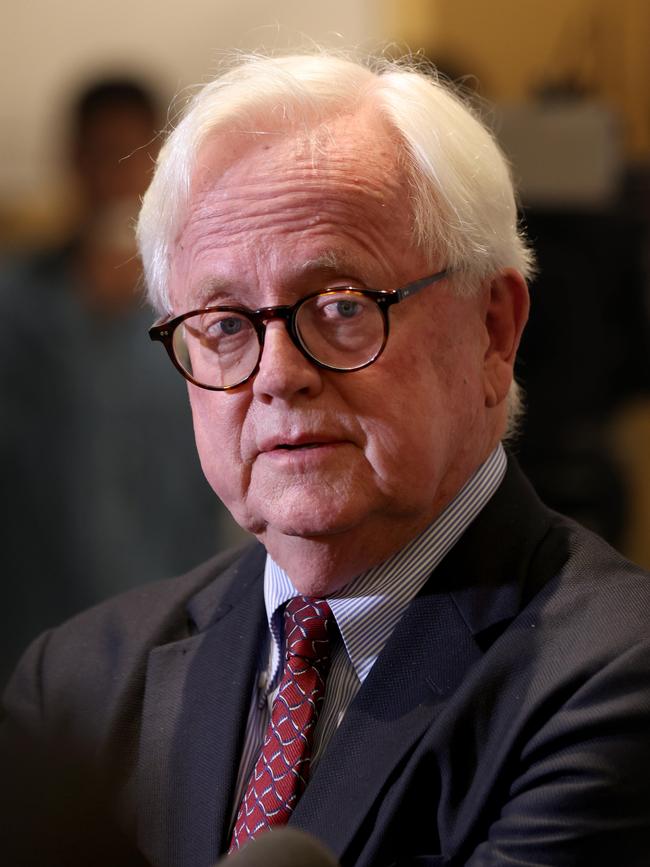The power play behind Robbie Cooke’s dramatic exit as Star CEO
The stand-off is a deeply serious moment for the Star casino that now risks losing everything.

QLD Business
Don't miss out on the headlines from QLD Business. Followed categories will be added to My News.
The bigger message behind the stunning exit of outgoing Star Entertainment boss Robbie Cooke is that NSW regulator Philip Crawford is more interested in exerting control over the Sydney casino than in its rehabilitation.
Star and its long-suffering investors came off a bruising second-best in a dispute with the NSW Independent Casino Commissioner that has been simmering for months as Cooke was forced to fall on his sword to break the impasse.
This means the operator of casinos in Sydney, Gold Coast and Brisbane is now without the one person who has been instrumental in holding it all together for the past 16 months.
Cooke, the former Tatts boss, was the cleanskin brought in for the herculean clean-up job that really was a matter of survival for Star.
Since then, he has pulled every lever available to keep Star’s bankers at bay while he set about rebuilding the casino from the ground up. Cooke’s exit represents a symbolic stand for shareholder rights over regulator overreach, but unfortunately it has only served to strengthen the hand of Crawford.

Among the string of federal and state regulators collectively nudging Star into a place of reform, NSW has consistently represented the biggest obstacle.
It’s probably no surprise, given NSW’s gaming regulator was badly exposed in the landmark review under Adam Bell two years ago. Much of Star’s appalling behaviour took place in Sydney under the regulator’s nose.
However, the reformed regulator under Crawford needs to be honest about the scale of change needed in a short time under an entirely new board and new management team. It also needs to ask whether a new owner would move any quicker on cultural changes if the business was sold today.
Crawford has narrowed in on the last mile of reforms needed to win over NSW and intentionally ignored the entirety of the rehabilitation under way at Star. And Crawford wants to do it in his own timeline.
The regulator had also sought to publicly undermine Cooke’s own authority when last month he suggested that much of the reform work to date was the result of a special manager installed by the regulator rather than Cooke’s own efforts.
So too, without any evidence of wrongdoing, the regulator is now walking dangerously close to trampling on the rights of shareholders by determining who gets to run the business.
‘Determining factor’
Cooke had been pushing back on Crawford’s persistent demands to replace several of his top executives, including chief financial officer Christina Katsibouba, chief customer officer George Hughes, and Cooke’s own chief of staff Peter Jenkins.
Cooke told staff over the weekend there were a number of factors leading to his decision, but a dispute over the appointments had been a “determining factor” that had meant Star was unlikely to win its licence back in NSW if he continued as CEO.
Cooke had argued to the regulator that none of the executives were part of the previous management team that had allowed Star to go so badly off the rails. None had findings made against them in separate inquiries by NSW and Queensland, and according to Cooke, there was nothing to suggest they were bad actors.
Cooke has maintained he always needed some people among his new executives who had institutional knowledge of Star.

This was particularly important when it came to Katsibouba, who was instrumental in helping Cooke successfully deal with equity and bond investors as well as banks as Star attempted to refinance $450m of debt and get a $750m share raising away.
While NSW’s Bell review had labelled each of the executives as “close associates” of Star at the time the casino had been flouting the rules, it said “no credible adverse information” had been received about them. The Bell inquiry concluded it was in no position to make a finding on their suitability. But Crawford still acted. By Friday night, all were gone, along with Cooke.
At the same time, Crawford had said Cooke was not moving fast enough in the long list of reforms, including cultural changes. Indeed, in a recent interview, Crawford raised doubts that Cooke’s work on cultural reform “was serious”.
Cooke told staff he fundamentally disagreed with Crawford’s assertion on the pace of reform and that real progress was being made. He has previously told investors his focus was on delivering as many remediation milestones as quickly as possible “without compromising quality”.
Bell 2.0
In Queensland the remediation plan had been approved, and new anti-money laundering controls had been put in place. The business and reporting lines have been restructured, while hundreds of staff have been hired across AML, risk and fraud. The controls covering every operation of the casino have been painstakingly rebuilt.
Few large organisations – even within government – can set about fundamentally reforming corporate culture in under two years. Cooke always said Star’s turnaround was a multi-year journey.
Even so, NSW’s Crawford used this argument as a platform to launch his “Bell 2.0” to investigate whether the casino was progressing ahead with its reform program to regain its casino licence. Unlike Queensland’s regulator, which has granted an extension to Star’s reform journey there, Crawford has no intention of extending Star’s special manager appointment beyond the end of June.
Unlike the initial Bell inquiry, this was to run behind closed doors. Star executives were quietly confident they would get a better hearing.
Now without the CEO central to the reform process and the CFO, as well as another round of management disruption, the NSW casino commissioner has created a situation where reforms already under way are likely to stall.
He has also disrupted Star’s ongoing negotiations with other regulators and made vulnerable. Indeed, there is now a real chance Star could lose its NSW licence, putting in doubt thousands of jobs and further investment in the state.
Star’s choices
Where does this leave Star? In an even more precarious situation than it was.
Chairman David Foster has stepped in as executive chair and intends to recruit a new CEO, but it will take time to find anyone who wants the job. But the biggest risks are now out of Star’s control.
The immediate challenge is for Star to get over its regulatory hurdle in NSW. A negative finding from the regulator over its suitability could see it lose the licence and the need to appoint an administrator to the Sydney casino, putting it in the situation of being a forced seller.
This could have a knock-on effect, with Queensland closely watching any developments in NSW.

Without a stable management team, Star also risks going backwards in Queensland, where it arguably has more at stake, with Brisbane’s $3.6bn Queen’s Wharf project in its final stages.
Star too is in the very pointy end of negotiations with financial crimes regulator Austrac over money laundering and financial crimes allegations. This will represent the biggest financial pain point. Rival Crown last year negotiated a $450m penalty, and Star has set aside a similar amount.
Few listed companies have faced as many simultaneous shocks as Star: ongoing legal action with Austrac, ASIC proceedings against former executives, shareholder class actions, negotiations with NSW government on increased gaming duty rate, two equity raisings, a dispute with the Queensland builder and a downturn in operations.
johnstone@theaustralian.com.au
Originally published as The power play behind Robbie Cooke’s dramatic exit as Star CEO



